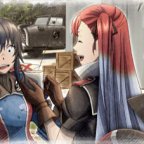Tohoku Pacific Earthquake

Sendai, Miyagi prefecture (Kyodo News/Associated Press)
I don’t normally like to write about breaking news because generally I find that I have neither the first-hand expertise nor the retrospective hindsight to comment on most real-time events non-trivial. The story would be very different if the earthquake had happened three weeks later when I will be in Tokyo and perhaps Kamakura and/or Tochigi, but it didn’t.
That said, I feel compelled to write something about the largest earthquake ever recorded in Japan after spending the past two days following the continuous Twitter updates and watching NHK and TBS news streams. So here it is.
First of all, I am not very good at expressing emotions through words, so forgive me if my language does not sufficiently convey the gravity of the situation. I hope that people affected by this disaster will find the relief that they need, but I suspect that my words and opinions will make no difference either way. Thoughts and prayers do have the power to effect positive outcomes indirectly but they are not my modus operandi. I can only offer some second-hand perspectives.
I was very inspired by the manner in which the Japanese people conduct themselves in times of crisis. They are clearly well-prepared for this. There are numerous anecdotes on Twitter about the calm and efficient manner in which regular civilians conducted themselves during the pandemonium.

Tokyo (Hiro Komae/Associated Press)
Years ago, AP’s Tomoko Hosoka wrote a story about the millions of office workers who would be stranded hours away by foot from their home in the aftermath of a quake due to the massive commuting traffic in Tokyo Metropolis. This was exactly what happened two days ago when, in an unprecedented event, all trains and metro subway services in Tokyo were suspended. But surprisingly, no one died from exposure, stampede or such avoidable tragedies that one comes to expect in the midst of such chaos. The proposed plan mentioned in the article was put to good use and Google Maps was used on various social network sites to alert people to all the schools and facilities designated as disaster shelter.
In fact, not a single building collapsed and the total death toll in Tokyo is in the single digit, an impressive feat given that, though far from the epicentre, the tremors experienced in the capital would have been respectable headline-grabbing earthquakes themselves had they occurred in isolation. The effectiveness of Tokyo’s contingency plans must be applauded.
A fascinating bit of titbit I learnt in the process: many newer beverage vending machines in Japan dispense for free if you pull an emergency level. I hate to make generalizations about groups of people, but I can think of a mountain of reasons why this would never work in many other countries.
I mean Japan is a country where the yakuza routinely volunteers for disaster relief. The yakuza groups Sumiyoshi-kai and Inagawa-kai are both participating in the on-going efforts and the Sumiyoshi-kai (yes, this guy is an actual yakuza) was providing free shelter for stranded commuters in Tokyo on Friday night.
There is a level of general civility that permeates all levels of Japanese society that is difficult to explain. Perhaps it is the result of the country’s relative cultural homogeneity, a strong emphasis on collectivism and societal pressure, an educated populace or some kind of historical inheritance. Whatever the reason, it serves the nation well in times of crisis such as this.
Oh, and here’s a song Kimi de Ite Buji de Ite (Please be yourself, please be safe) composed and sung by Yoko Kanno, a Miyagi native, for the earthquake victims.

Kesennuma city, Miyagi prefecture (Keichi Nakane/Associated Press/The Yomiuri Shimbun)
The situation in Tohoku is a lot more serious than in Tokyo. One interesting piece of information I learnt from people tweeting from Japan is that many people in Tokyo chose to remain in their offices on Friday because they trust their high-rise office buildings to withstand the earthquakes more than they trust their private housings. I am guessing that the rural areas of Tohoku do not enjoy such luxuries.
UK’s The Independent ran a front-page cover with the Hinomaru flag and the words “Don’t give up, Japan. Don’t give up, Tohoku” in both English and Japanese.
Currently, there are fears of meltdown in multiple nuclear reactors in Fukushima caused by the total failure of backup generators that were hit by tsunami waves that exceeded the planned height. This sounds terrifying because “meltdown” conjures images of atomic mushroom clouds and Chernobyl, but the facts and analysis are not that gloomy. My personal feeling is that the media is colouring the facts with a mixture of ignorance and individual bias.
Still, regardless of the final outcome of the situation, nuclear energy appears to have been dealt yet another fatal blow. Germany’s government is fighting to defend its nuclear policy while oppositions in countries considering nuclear power are jumping at this opportunity to bolster their argument.
In Singapore, The Online Citizen, a prominent alternative pro-opposition news blog, posted a rather transparent remark on Facebook saying “Singapore continues to consider nuclear power” while linking to an article about Fukushima’s reactors. It was a cheap shot and they ought to be ashamed. Of course this was immediately topped by the state media Channel News Asia‘s mass email soliciting for advertisers to buy ad spots in its upcoming intensive coverage of the Tohoku earthquake. Talk about ambulance chasing.
Japan is known as the country with the best nuclear safety standards and earthquake preparations and even it has apparently been bested, or at least that is the narrative that the major media outlets seem to have agreed upon — I suspect that the facts will in the long run demonstrate that the danger was greatly exaggerated due to hyper-sensitivity to the word “nuclear”.

Iwaki city, Fukushima prefecture. (Kyodo News/Associated Press)
As of right now, I still plan to continue with my trip to Japan at the end of this month. The scenes of destruction being constantly replayed on various news networks were taken from Tohoku, a relatively rural region in north-eastern Japan, while most of my itinerary involves western Japan. I will also be spending a week in Tokyo, but I am not too worried about it. I have great confidence in Tokyo’s ability to rapidly recover from huge disasters based on an extensive review of Godzilla- and Ultraman-related materials. Cue the omg-how-dare-you-joke-about-this righteous indignation.
On another note, I just want to say that Twitter has really made me feel like I am truly living in the future. (Relevant xkcd strip.) I follow a wide variety of people, and all of them, including members of the anime community, singers, seiyuu, titans of the English blogosphere, news professionals, politicians, real-life acquaintances, were tweeting in real-time throughout and discussing the same issues from very different perspectives including many first-hand ones.
The conversation threads on Twitter were timely, spontaneous and interlinked in a manner that transcends traditional boundaries. It is easy to dismiss social networking as a hive of egotists and exhibitionists and it has become a popular refrain to question the purpose of Twitter whenever the topic pops up in an online discussion elsewhere, but ultimately I really think that micro-blogging in general has a very important role to play in the future ahead.
I’ll just end this long thought dump here. I wish everyone in Japan the best in the days ahead. 幸運を祈る。







March 14th, 2011 at 2:59 am
I too cannot but feel admiration for how prepared the Japanese are in such dire times. Japan is already picking itself up slowly, and certainly the many lessons they’ve learned will make them stronger and more prepared for such events in the future. ( which unfortunately will always be around )
As you mentioned, Twitter was the single best resource for the latest news on the quake. We are witnessing the evolution of the internet.
March 14th, 2011 at 3:00 am
How much do you estimate the effect on anime and airing, game publishing and all the merchandise? It looks bleak… but in place are a lot of charity stuff and goings-on that we should try and contribute to. Of course relief donations help but don’t put too much into it just yet I would say…
Air Reitaisai, Air White Valentine’s and possibly Air April Fool’s… this sucks but it’s no time to have them, sadly.
March 14th, 2011 at 3:21 am
Thanks for these thoughts. I’ve been trying to pay attention to news of this extremely traumatizing and unfortunate disaster, though it is exhausting when the political side begins to unravel; like Germany’s position on the nuclear troubles. What I have begun seeing are more positive facts, such as that rescuers have saved over 12,000 people so far, and I feel both Japan and the world should focus on the positive aspects equally when weighed with the negative aspects. Japan is left with much sadness, chaos, and devastation, but also hope, life, and perseverance. I feel myself, as an outsider, must stay positive despite being saddened by the negatives.
This event is alarming. Japan is perhaps the most ideal nation to handle massive natural disaster, as the geological location is subject to a variety of deadly forces but also due to their technological prowess and culture. Regardless of being potentially the ‘best of the best’ in their ability to handle this situation, I feel I am stricken with a realization that there is no complete solution to prevent the loss of lives and livelihood when it comes to nature.
Right now Japan and the rest of the world is answering to the call of “what needs to be done this instant?,” but I feel many scientists and engineers are also on the move in trying to answer a monumental question of “what could be done better, if anything?” and “if anything, what can we do this instant?”
Wish you well on your trip to Japan!
March 15th, 2011 at 5:29 am
Thank you for posting your thoughts on the events so far in Japan. The song by Yoko Kanno hit home for me. It’s an immense tragedy, unfathomable for me who have never experienced an earthquake, let alone a tsunami. It also seems the volcano Shinmoedak have erupted after the earthquake, adding to the gravity of the situation. I so hope missing people will turn out to be alright, but seeing the images from the areas it seems a slim hope. Another hope of light is what you described as the organized manner in which the disaster is being handled by civilians. They give me hope for humanity as they do their best to cope with the situation.
March 15th, 2011 at 9:36 pm
Azu: is anime and manga all you can think about?!
March 16th, 2011 at 12:01 am
When the quake hit Tokyo(several days before), I’m in the heart of Tokyo. The quake is very strong for Tokyo standard. But I didn’t feel danger. Yes, I’m fine.
Detail my own situation in 11/Mar was written in my JP blog as below.
http://don777.cocolog-nifty.com/blog/2011/03/201103-8361.html
March 16th, 2011 at 8:46 am
Do I go to hell for shouting darn when you said you would continue the trip and laughing at the Ultraman/Godzilla joke?